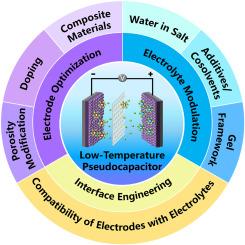Emerging trends in electrochemical energy storage: A focus on low-temperature pseudocapacitors
引用次数: 0
Abstract
Supercapacitors, also known as ultracapacitors or electrochemical capacitors, play a vital role in modern energy storage and electronic systems due to their outstanding characteristics. They boast high power density, making them ideal for applications requiring rapid energy delivery and absorption, such as electric vehicles for quick acceleration and regenerative braking. Additionally, their extended cycle life, enduring hundreds of thousands to millions of charge-discharge cycles, suits scenarios demanding consistent, long-term performance. The field of low-temperature pseudocapacitors (LTPCs) has seen significant advancements, becoming a key domain in energy storage research. This review explores the latest developments in LTPCs, highlighting their potential as efficient energy storage devices. It delves into their unique properties contributing to enhanced pseudocapacitive performance at low temperatures and dissects the electrochemical processes governing this phenomenon. Recent breakthroughs in device architectures and engineering strategies are showcased, addressing challenges like freezing-induced electrolyte degradation and reduced ion mobility. This review concludes by outlining potential research directions and key challenges for advancing LTPCs towards practical, widespread applications. It serves as a valuable resource for scientists, engineers, and policymakers, guiding the future development of energy storage technologies tailored for low-temperature environments.
© 2012 Published by Elsevier Ltd. Selection and/or peer-review under responsibility of Global Science and Technology Forum Pte Ltd.

电化学储能的新趋势:聚焦低温伪电容器
超级电容器又称超级电容器或电化学电容器,因其出色的特性而在现代能源存储和电子系统中发挥着至关重要的作用。超级电容器具有高功率密度,因此非常适合需要快速输送和吸收能量的应用,例如用于快速加速和再生制动的电动汽车。此外,它们的循环寿命长,可经受数十万至数百万次的充放电循环,适合需要长期稳定性能的应用场合。低温伪电容器(LTPC)领域取得了重大进展,已成为储能研究的一个关键领域。这篇综述探讨了低温伪电容器的最新发展,强调了它们作为高效储能设备的潜力。文章深入探讨了它们在低温下有助于增强伪电容性能的独特特性,并剖析了支配这一现象的电化学过程。文章展示了最近在器件架构和工程策略方面取得的突破,以应对冷冻引起的电解质降解和离子迁移率降低等挑战。本综述最后概述了推动 LTPCs 走向实际、广泛应用的潜在研究方向和关键挑战。它为科学家、工程师和政策制定者提供了宝贵的资源,为未来开发适合低温环境的储能技术提供了指导。由 Global Science and Technology Forum Pte Ltd 负责遴选和/或同行评审。
本文章由计算机程序翻译,如有差异,请以英文原文为准。
求助全文
约1分钟内获得全文
求助全文

 求助内容:
求助内容: 应助结果提醒方式:
应助结果提醒方式:


